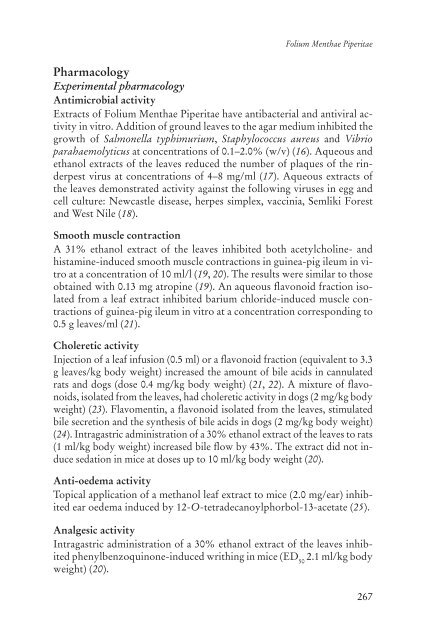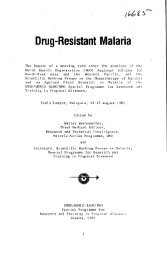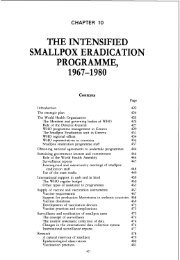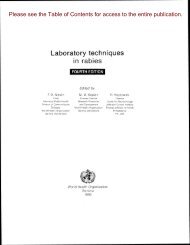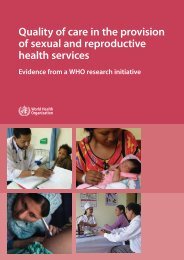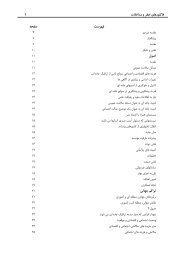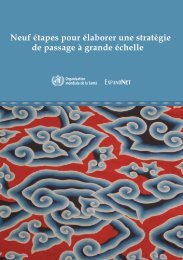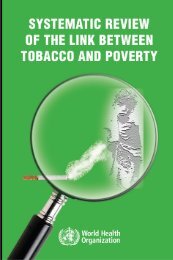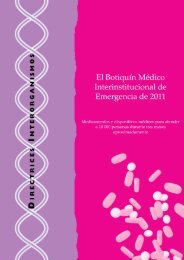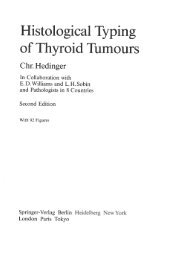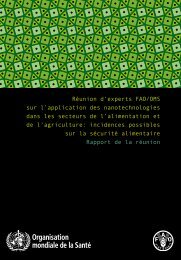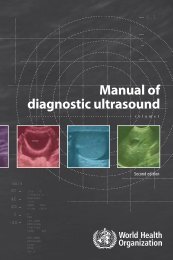- Page 1:
WHO monographs on medicinal plants
- Page 4 and 5:
WHO Library Cataloguing-in-Publicat
- Page 6 and 7:
Contents Herba Thymi 383 Flos Tilia
- Page 9 and 10:
Introduction Background The results
- Page 11 and 12:
Introduction monographs on herbal m
- Page 13 and 14:
General technical notices These WHO
- Page 15:
General technical notices The Exper
- Page 18 and 19:
WHO monographs on medicinal plants
- Page 20 and 21:
WHO monographs on medicinal plants
- Page 22 and 23:
WHO monographs on medicinal plants
- Page 24 and 25:
WHO monographs on medicinal plants
- Page 26 and 27:
WHO monographs on medicinal plants
- Page 28 and 29:
WHO monographs on medicinal plants
- Page 30 and 31:
WHO monographs on medicinal plants
- Page 32 and 33:
WHO monographs on medicinal plants
- Page 34 and 35:
WHO monographs on medicinal plants
- Page 36 and 37:
WHO monographs on medicinal plants
- Page 38 and 39:
WHO monographs on medicinal plants
- Page 40 and 41:
WHO monographs on medicinal plants
- Page 42 and 43:
WHO monographs on medicinal plants
- Page 45 and 46:
Herba Bidentis Definition Herba Bid
- Page 47 and 48:
Herba Bidentis multicellular with a
- Page 49 and 50:
Herba Bidentis Chemical assays Cont
- Page 51 and 52:
Herba Bidentis ity in vivo against
- Page 53 and 54:
Herba Bidentis References 1. USSR p
- Page 55:
Herba Bidentis 42. Kortikov VN, Kor
- Page 58 and 59:
WHO monographs on medicinal plants
- Page 60 and 61:
WHO monographs on medicinal plants
- Page 62 and 63:
WHO monographs on medicinal plants
- Page 64 and 65:
WHO monographs on medicinal plants
- Page 66 and 67:
WHO monographs on medicinal plants
- Page 69 and 70:
Flos Chamomillae * Definition Flos
- Page 71 and 72:
Flos Chamomillae Geographical distr
- Page 73 and 74:
Flos Chamomillae Dosage forms Dried
- Page 75 and 76:
Flos Chamomillae Intradermal applic
- Page 77 and 78:
Flos Chamomillae able directly thro
- Page 79:
Flos Chamomillae steroidalen (5% Bu
- Page 82 and 83:
WHO monographs on medicinal plants
- Page 84 and 85:
WHO monographs on medicinal plants
- Page 86 and 87:
WHO monographs on medicinal plants
- Page 88 and 89:
WHO monographs on medicinal plants
- Page 90 and 91:
WHO monographs on medicinal plants
- Page 92 and 93:
WHO monographs on medicinal plants
- Page 94 and 95:
WHO monographs on medicinal plants
- Page 96 and 97:
WHO monographs on medicinal plants
- Page 99 and 100:
Folium cum Flore Crataegi * Definit
- Page 101 and 102:
Folium cum Flore Crataegi the cells
- Page 103 and 104:
Folium cum Flore Crataegi noid deri
- Page 105 and 106:
Folium cum Flore Crataegi pr o c y
- Page 107 and 108:
Folium cum Flore Crataegi arrhythmi
- Page 109 and 110:
Folium cum Flore Crataegi tract (co
- Page 111 and 112:
Folium cum Flore Crataegi extract a
- Page 113 and 114:
Folium cum Flore Crataegi metabolic
- Page 115 and 116:
Folium cum Flore Crataegi 21. Ficar
- Page 117 and 118:
Folium cum Flore Crataegi trique et
- Page 119:
Folium cum Flore Crataegi 83. Hecke
- Page 122 and 123:
WHO monographs on medicinal plants
- Page 124 and 125:
WHO monographs on medicinal plants
- Page 126 and 127:
WHO monographs on medicinal plants
- Page 128 and 129:
WHO monographs on medicinal plants
- Page 130 and 131:
WHO monographs on medicinal plants
- Page 132 and 133:
WHO monographs on medicinal plants
- Page 134 and 135:
WHO monographs on medicinal plants
- Page 136 and 137:
WHO monographs on medicinal plants
- Page 138 and 139:
WHO monographs on medicinal plants
- Page 140 and 141:
WHO monographs on medicinal plants
- Page 142 and 143:
WHO monographs on medicinal plants
- Page 144 and 145:
WHO monographs on medicinal plants
- Page 146 and 147:
WHO monographs on medicinal plants
- Page 148 and 149:
WHO monographs on medicinal plants
- Page 150 and 151:
WHO monographs on medicinal plants
- Page 152 and 153:
WHO monographs on medicinal plants
- Page 154 and 155:
WHO monographs on medicinal plants
- Page 156 and 157:
WHO monographs on medicinal plants
- Page 158 and 159:
WHO monographs on medicinal plants
- Page 160 and 161:
WHO monographs on medicinal plants
- Page 162 and 163:
WHO monographs on medicinal plants
- Page 164 and 165:
WHO monographs on medicinal plants
- Page 166 and 167:
WHO monographs on medicinal plants
- Page 169 and 170:
Radix Glycyrrhizae * Definition Rad
- Page 171 and 172:
Radix Glycyrrhizae Glycyrrhiza ural
- Page 173 and 174:
Radix Glycyrrhizae Dilute alcohol-s
- Page 175 and 176:
Radix Glycyrrhizae Uses described i
- Page 177 and 178:
Radix Glycyrrhizae Contraindication
- Page 179 and 180:
Radix Glycyrrhizae 13. Chin WY, Ken
- Page 181:
Radix Glycyrrhizae 46. Rask-Madsen
- Page 184 and 185:
WHO monographs on medicinal plants
- Page 186 and 187:
WHO monographs on medicinal plants
- Page 188 and 189:
WHO monographs on medicinal plants
- Page 190 and 191:
WHO monographs on medicinal plants
- Page 192 and 193:
WHO monographs on medicinal plants
- Page 195 and 196:
Fructus Hippophaës recens Definiti
- Page 197 and 198:
Fructus Hippophaës recens mis has
- Page 199 and 200:
Fructus Hippophaës recens extracti
- Page 201 and 202:
Fructus Hippophaës recens diation
- Page 203 and 204:
Fructus Hippophaës recens rocytes
- Page 205 and 206:
Fructus Hippophaës recens For inte
- Page 207 and 208:
Fructus Hippophaës recens 40. Yue
- Page 209 and 210:
Herba Hyperici * Definition Herba H
- Page 211 and 212:
Herba Hyperici beaded. Dorsoventral
- Page 213 and 214:
Herba Hyperici Major chemical const
- Page 215 and 216:
Herba Hyperici Uses reported in pha
- Page 217 and 218:
Herba Hyperici An ethanol extract o
- Page 219 and 220:
Herba Hyperici Effect on smooth mus
- Page 221 and 222:
Herba Hyperici hypericin) daily for
- Page 223 and 224: Herba Hyperici tract of the herb fo
- Page 225 and 226: Herba Hyperici 24.8-26.5 hours and
- Page 227 and 228: Herba Hyperici trations, leading to
- Page 229 and 230: Herba Hyperici 9. British herbal ph
- Page 231 and 232: Herba Hyperici mische und klinische
- Page 233 and 234: Herba Hyperici 77. Wood S et al. An
- Page 235: Herba Hyperici 111. Konig CD. Hyper
- Page 238 and 239: WHO monographs on medicinal plants
- Page 240 and 241: WHO monographs on medicinal plants
- Page 242 and 243: WHO monographs on medicinal plants
- Page 244 and 245: WHO monographs on medicinal plants
- Page 246 and 247: WHO monographs on medicinal plants
- Page 248 and 249: WHO monographs on medicinal plants
- Page 250 and 251: WHO monographs on medicinal plants
- Page 252 and 253: WHO monographs on medicinal plants
- Page 254 and 255: WHO monographs on medicinal plants
- Page 256 and 257: WHO monographs on medicinal plants
- Page 258 and 259: WHO monographs on medicinal plants
- Page 260 and 261: WHO monographs on medicinal plants
- Page 262 and 263: WHO monographs on medicinal plants
- Page 264 and 265: WHO monographs on medicinal plants
- Page 266 and 267: WHO monographs on medicinal plants
- Page 268 and 269: WHO monographs on medicinal plants
- Page 270 and 271: WHO monographs on medicinal plants
- Page 272 and 273: WHO monographs on medicinal plants
- Page 276 and 277: WHO monographs on medicinal plants
- Page 278 and 279: WHO monographs on medicinal plants
- Page 280 and 281: WHO monographs on medicinal plants
- Page 282 and 283: WHO monographs on medicinal plants
- Page 284 and 285: WHO monographs on medicinal plants
- Page 286 and 287: WHO monographs on medicinal plants
- Page 288 and 289: WHO monographs on medicinal plants
- Page 290 and 291: WHO monographs on medicinal plants
- Page 293 and 294: Herba Origani Definition Herba Orig
- Page 295 and 296: Herba Origani rolla-like, glabrous
- Page 297 and 298: Herba Origani Heavy metals For maxi
- Page 299 and 300: Herba Origani essential oil of the
- Page 301 and 302: Herba Origani Contraindications If
- Page 303 and 304: Herba Origani 24. Muravjova DA, Sam
- Page 305 and 306: Herba Origani 60. Oka Y et al. Nema
- Page 307 and 308: Herba Pegani harmalae Definition He
- Page 309 and 310: Herba Pegani harmalae contain mucil
- Page 311 and 312: Herba Pegani harmalae dominate. Oth
- Page 313 and 314: Herba Pegani harmalae ously and 2 m
- Page 315 and 316: Herba Pegani harmalae Adverse react
- Page 317 and 318: Herba Pegani harmalae 21. Pakalns D
- Page 319: Herba Pegani harmalae 60. Al-Shamma
- Page 322 and 323: WHO monographs on medicinal plants
- Page 324 and 325:
WHO monographs on medicinal plants
- Page 326 and 327:
WHO monographs on medicinal plants
- Page 328 and 329:
WHO monographs on medicinal plants
- Page 330 and 331:
WHO monographs on medicinal plants
- Page 332 and 333:
WHO monographs on medicinal plants
- Page 334 and 335:
WHO monographs on medicinal plants
- Page 336 and 337:
WHO monographs on medicinal plants
- Page 338 and 339:
WHO monographs on medicinal plants
- Page 340 and 341:
WHO monographs on medicinal plants
- Page 342 and 343:
WHO monographs on medicinal plants
- Page 344 and 345:
WHO monographs on medicinal plants
- Page 346 and 347:
WHO monographs on medicinal plants
- Page 348 and 349:
WHO monographs on medicinal plants
- Page 350 and 351:
342
- Page 352 and 353:
WHO monographs on medicinal plants
- Page 354 and 355:
WHO monographs on medicinal plants
- Page 356 and 357:
WHO monographs on medicinal plants
- Page 358 and 359:
WHO monographs on medicinal plants
- Page 360 and 361:
WHO monographs on medicinal plants
- Page 362 and 363:
WHO monographs on medicinal plants
- Page 364 and 365:
WHO monographs on medicinal plants
- Page 366 and 367:
WHO monographs on medicinal plants
- Page 368 and 369:
WHO monographs on medicinal plants
- Page 371 and 372:
Folium Sennae * Definition Folium S
- Page 373 and 374:
Folium Sennae 10 4 /g. Preparations
- Page 375 and 376:
Folium Sennae Medicinal uses Uses s
- Page 377 and 378:
Folium Sennae induce hypokalaemia,
- Page 379 and 380:
Folium Sennae 19. Guidelines for pr
- Page 381 and 382:
Radix cum Herba Taraxaci * Definiti
- Page 383 and 384:
Radix cum Herba Taraxaci General id
- Page 385 and 386:
Radix cum Herba Taraxaci Pharmacolo
- Page 387 and 388:
Radix cum Herba Taraxaci intraperit
- Page 389 and 390:
Radix cum Herba Taraxaci 13. Qualit
- Page 391 and 392:
Herba Thymi * Definition Herba Thym
- Page 393 and 394:
Herba Thymi General identity tests
- Page 395 and 396:
Herba Thymi Uses described in pharm
- Page 397 and 398:
Herba Thymi Nursing mothers See Pre
- Page 399:
Herba Thymi 29. Juven BJ, Kanner J,
- Page 402 and 403:
WHO monographs on medicinal plants
- Page 404 and 405:
WHO monographs on medicinal plants
- Page 406 and 407:
WHO monographs on medicinal plants
- Page 408 and 409:
WHO monographs on medicinal plants
- Page 410 and 411:
WHO monographs on medicinal plants
- Page 412 and 413:
WHO monographs on medicinal plants
- Page 414 and 415:
WHO monographs on medicinal plants
- Page 416 and 417:
WHO monographs on medicinal plants
- Page 418 and 419:
WHO monographs on medicinal plants
- Page 420 and 421:
WHO monographs on medicinal plants
- Page 422 and 423:
WHO monographs on medicinal plants
- Page 424 and 425:
WHO monographs on medicinal plants
- Page 426 and 427:
WHO monographs on medicinal plants
- Page 428 and 429:
WHO monographs on medicinal plants
- Page 431 and 432:
Styli cum stigmatis Zeae maydis Def
- Page 433 and 434:
Styli cum stigmatis Zeae maydis Mic
- Page 435 and 436:
Styli cum stigmatis Zeae maydis bee
- Page 437 and 438:
Styli cum stigmatis Zeae maydis min
- Page 439 and 440:
Styli cum stigmatis Zeae maydis ous
- Page 441 and 442:
Styli cum stigmatis Zeae maydis Nur
- Page 443 and 444:
Styli cum stigmatis Zeae maydis 37.
- Page 445:
Styli cum stigmatis Zeae maydis 73.
- Page 448 and 449:
WHO monographs on medicinal plants
- Page 450 and 451:
442
- Page 452:
Despite the increasing use of herba


